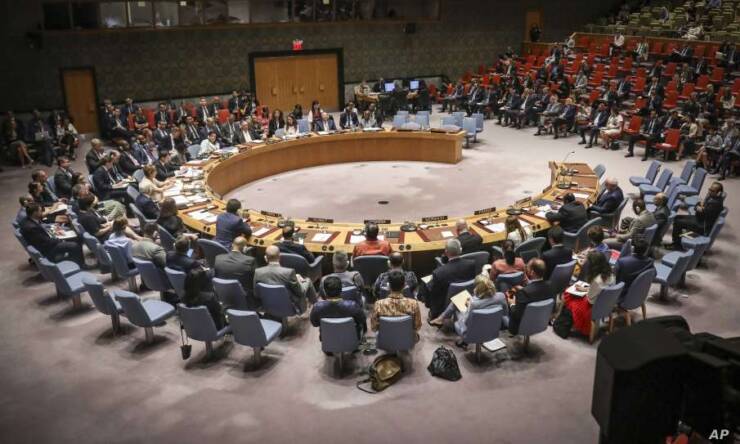
New York: Hitting out at Washington, China said the US itself is not qualified to make irresponsible remarks on the issue of the South China Sea. The US and China on August 9 clashed during a high-level meeting on maritime security chaired by Prime Minister Narendra Modi, with Washington asserting it has seen “provocative actions” to advance unlawful maritime claims in the South China Sea by Beijing which retorted that America is not qualified to make “irresponsible remarks” on the issue.
Prime Minister Modi chaired the virtual high-level open debate on maritime security, one of the three signature events of India’s current Presidency of the powerful 15-nation UN body. The meeting was later chaired by External Affairs Minister S Jaishankar as foreign ministers and UN envoys made their national statements.
US Secretary of State Antony Blinken spoke of “some of the critical areas where we see maritime rules and principles under threat.” “In the South China Sea, we have seen dangerous encounters between vessels at sea and provocative actions to advance unlawful maritime claims,” Blinken said, in a thinly-veiled attack on China which claims almost all of the 1.3 million square-mile South China Sea as its sovereign territory.
China has been building military bases on artificial islands in the region also claimed by Brunei, Malaysia, the Philippines, Taiwan and Vietnam.
“The United States has made clear its concerns regarding actions that intimidate and bully other states from lawfully accessing their maritime resources. And we and other countries including South China Sea claimants have protested such behaviour and unlawful maritime claims in the South China Sea,” Blinken said.
“Some may assert that resolving the dispute in the South China Sea is not the business of the United States or any other country that is not a claimant to the islands and waters. But it is the business, and even more, the responsibility of every Member State to defend the rules that we’ve all agreed to follow and peacefully resolve maritime disputes.
“Conflict in the South China Sea or in any ocean would have serious global consequences for security and for commerce. What’s more, when a State faces no consequences for ignoring these rules, it fuels greater impunity and instability everywhere,” Blinken said.
China’s Deputy Permanent Representative Dai Bing, speaking last in the meeting, said that he wishes to “point out that the Security Council is not the right place to discuss the issue of the South China Sea. The US just mentioned the South China Sea issue and China firmly opposes this act.”
He said that at present “with the joint efforts of China and ASEAN countries, the situation in the South China Sea remains generally stable. All countries enjoy freedom of navigation and overflight in accordance with international law.”
The Chinese diplomat said that Beijing is “determined and able to maintain peace and stability in the South China Sea.” Hitting out at Washington, he said the US itself is not qualified to make irresponsible remarks on the issue of the South China Sea.
“The US has been stirring up trouble out of nothing, arbitrarily sending advanced military vessels and aircraft into the South China Sea as provocations and publicly trying to drive a wedge into regional countries, especially countries concerned.
“This country itself has become the biggest threat to peace and stability in the South China Sea. The US itself does not join the UNCLOS (United Nations Convention on the Law of the Sea) but considers itself a judge of the Convention pointing fingers at other countries,” he said, adding that Washington has no credibility on maritime issues.
“The United States hype in the Security Council is entirely politically motivated. The South China Sea arbitration tribunal violated the Principle of State consent,” the Chinese diplomat said, adding that “there were obvious errors in the determination of facts and application of the law and its award was invalid and without any binding force.”
He said China and ASEAN countries are committed to fully and effectively implementing the declaration under the Conduct of Parties in the South China Sea and strive to reach the code of conduct in the South China Sea at an early date.
Blinken referred to the unanimous and legally binding decision five years ago by the arbitral tribunal constituted under the 1982 Law of the Sea Convention “firmly rejecting unlawful, expansive South China Sea maritime claims as being inconsistent with international law.”
He stressed that Washington has consistently called for all countries to conform their maritime claims to the International Law of the Sea as reflected in the 1982 convention.
“This is in keeping with the peaceful resolution of disputes and the sovereign equality of member states, which are core principles enshrined in the United Nations Charter,” he said, adding that efforts to resolve maritime disputes through threat or use of force flout these principles.
Blinken conveyed Washington’s gratitude to Prime Minister Modi for “bringing us together for this critically important discussion” on maritime security and for “India’s leadership on these issues,” especially in the Indo-Pacific.
He said despite having a clear body of international law that nations have committed to abide by and uphold and despite the indispensable role the maritime order has played in fostering economic activity, security cooperation, scientific innovation, environmental sustainability, the order is under serious threat.
“That’s why I’m grateful for India’s leadership in bringing us together today and calling on all nations to recommit to defending and strengthening the maritime rules and principles that we forge together and committed to uphold.”








